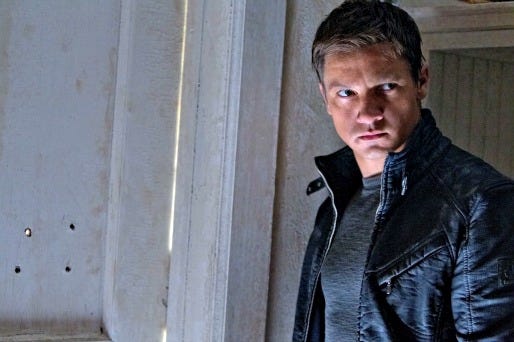The Bourne Legacy

At 2¼ hours, "The Bourne Legacy" is essentially one big long chase scene that never wants to stop, and with good reason. Because whenever it does, the audience starts thinking about the characters and the plot — how thinly drawn the former are and how the story structure crumbles to ashes with even a cursory examination.
As you probably know, this is the fourth movie in the Bourne superspy franchise, and it's missing one notable quantity: Jason Bourne. Matt Damon is out, and Jeremy Renner is in, but it's not just a cynical recasting of the same character by a different actor. Instead, it's an entirely different guy, but set in the same universe and caught in the same situation.
Jason Bourne is apparently still around; at one point, we hear he's spotted in Manhattan. But the CIA spooks cooped up in their now-ubiquitous high-tech control rooms are instead focused on Aaron Cross (Renner) instead. They peer at computer screens, which seem to be wired into every video camera on the planet, plus satellites up above, and shout urgent orders at each other that seem to have no real-world effects whatsoever.
One wonders if across town, another group of spymasters are jammed into another room barking their own orders in pursuit of Bourne.
No matter. Director Tony Gilroy, who co-wrote the screenplay with brother Dan, is less concerned with the whys and wherefores of the story than just keeping the action moving.
Cross first appears in a snowy mountain range, stalked by wolves and other dangers. Why is he stranded out there? Neither he, nor we, are ever really sure. But it seems that Outcome, the ultra-secret program of which he was an agent, has been deemed too dangerous to continue to exist. To wit: The CIA is busy killing all the spies, and Cross is the last one left.
It's a bit of a cheap ploy that all the Bourne movies have recycled. Bourne was in a program called Treadstone, but when its cover was blown they initiated another program, Briarpatch, to clean up the mess of Treadstone. Now it's Outcome that is the target and — yes, you guessed, there's another program beyond that one that's supposed to be even more extreme.
Based on these movies, it seems the CIA doesn't do anything but create and then shut down super-soldier operations, and all of its agents die trying to kill the "dangerous" agents.
The control method the spies have over the Outcome recruits is that they're genetically enhanced and must continually take drugs to maintain their physical and intellectual boost. Thus, Cross and his fellows can jump across mountain ravines, take out drone airplanes with a hunting rifle, and be shot, stabbed and pummeled and keep on going ... but only if they keep taking their little blue and green pills.
Rachel Weisz plays Marta Shearing, a doctor who administers the drugs to the agents, but is willfully ignorant of what they do until, of course, she becomes a target herself. Cross rides to her rescue, and they're on the run across the Eastern seaboard, and then the action jumps to Manila in the Philippines.
With the original Bourne movies, there at least was the conceit of Jason's amnesia to keep the narrative momentum rolling, as he labored to find out who he was, why people were trying to kill him and who was behind it all. Here, the chase is the first, and only, thing.
The action is engaging and daring, including a motorcycle chase that's positively rousing, as the two-wheeler carrying our heroes skitters and screeches all around the mayhem.
Gilroy, though, has a tendency to place his camera too close to the action, especially the hand-to-hand fight scenes, so we're never quite aware of exactly what's happening. Gilroy's previous credits behind the camera were "Michael Clayton" and "Duplicity," and his lack of action-movie experience is glaring.
"The Bourne Legacy" isn't a bad movie, and those just wanting a couple hours of mindless diversion may find it suits the bill. As spy thrillers go, this one's dumber than the average bear.
3 Yaps



